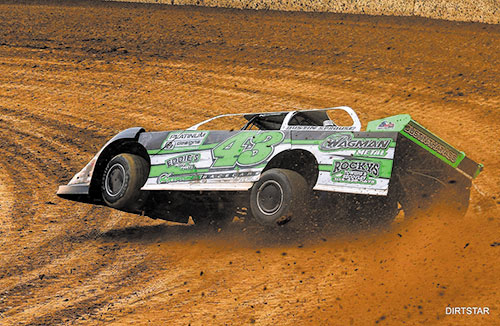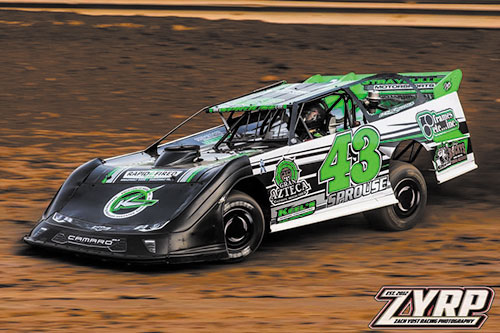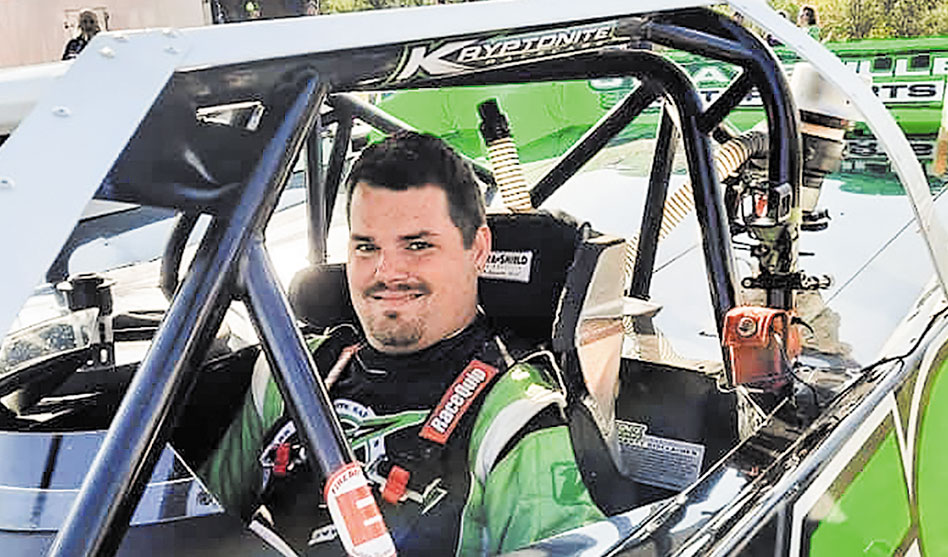And, yes, he answers all our questions about why he’s a Trump supporter
MIKEY ROX | Contributing Writer
mikeyroxprs@gmail.com
There’s no beating around the bush with competitive race car driver Dustin Sprouse: He’s out; he’s proud, and he’s an unrepentant Trump supporter.
Before you crumple up this page or close the browser window — like most LGBTQ folks are apt to do whenever they read the T-word — Sprouse implores you to hear him out. And so do I. Which is precisely why I chose to interview the 35-year-old amateur athlete who, in 2021, won Rookie of the Year in dirt-track racing’s Top Notch Late Model series.
Politics and sports seem to go hand-in-hand these days anyway. Auto racing is no different. Sprouse — thick like a grizzly on a 6-foot-2-inch frame — is at a crossroads, however. Being gay has limited his sponsorship within the blue-collar racing community while his conservative leanings alienate a large portion of the LGBTQ community.
As a recent cover story of the speedster in Sport Illustrated points out, his life is complicated.
 Sprouse is a Trump supporter, yes. But he’s also a passionate, caring, dedicated friend and family-oriented race car driver who yearns to be accepted for his wheel-spinning skills without being judged on the basis of his sexual orientation — or his political alignment.
Sprouse is a Trump supporter, yes. But he’s also a passionate, caring, dedicated friend and family-oriented race car driver who yearns to be accepted for his wheel-spinning skills without being judged on the basis of his sexual orientation — or his political alignment.
Even the open-minded need to be challenged now and again. Consider this a crash course.
Dallas Voice: Racing is in your blood. Your entire family has a need for speed, including your parents and your brother. Tell me a bit about your upbringing in West Virginia and your journey to becoming a professional dirt-track racer. Dustin Sprouse: My dad started racing in 1989, and that’s where my own love of racing began. I never went on vacations because we were always at the races every weekend. My brother started racing in 1997, and I started in 1999. We all got out of it in 2010 due to [a lack of] financial support. I found my way back in it in 2021 in the Top Notch Late Model series where I would end up winning the 2021 Steel Block Late Model Rookie of the Year. That brings us to where we are today.
What were some of the considerations you made when deciding to come out publicly in your early 20s? How was it received? I was really nervous about coming out in a redneck state, but when I was 23 years old, I finally did it and, believe it or not, the rednecks stayed my friends and the friends I thought would be are no longer my friends. Just have to respect others as they are.
Success in racing comes down to winning races, but it’s also about sponsorships — race cars are expensive and you’ve got to keep yours running if you want to compete. What’s the criteria for a sponsor choosing to affiliate with you? What’s in it for dirt-track racing sponsors? I’m looking for corporate backing from a national company that prides itself in being an ally to the LGBTQ community, a corporate partner that will commit to supporting my efforts at being the first openly gay driver competing at the top level of dirt track racing. This shows consumers that they are committed to building inclusivity into their brand and support the efforts of people like me who are unapologetic about who they are.
I put a great product on the track to advertise their business. I have a kind heart; I’m a good sport, and I’m a great person to be a public representative for your business.
 Sponsorship has largely eluded you because you’re gay. How does that change, and how long can you compete without that deep-pocketed corporate financing? I’ll continue racing at a local amateur level if I’m not successful at attracting meaningful corporate backing. However, if I’m fortunate enough to secure a strong sponsor interested in supporting my racing career, I know in my heart I can compete at a professional level in national dirt track racing.
Sponsorship has largely eluded you because you’re gay. How does that change, and how long can you compete without that deep-pocketed corporate financing? I’ll continue racing at a local amateur level if I’m not successful at attracting meaningful corporate backing. However, if I’m fortunate enough to secure a strong sponsor interested in supporting my racing career, I know in my heart I can compete at a professional level in national dirt track racing.
The Sports Illustrated cover story on you published at the end of last year [discusses] one of your crewmembers, Eric Barber, who remorsefully attended the Jan. 6 insurrection, detailing how the confluence of social media and politics affected his mental health. In the same piece, you proudly proclaim to be a Trump supporter. First, why are you a Trump supporter? I like Trump for his “America first” policies. I support the coal industry, and I have friends who depend on oil and pipelines for employment. I felt like our economy was strong under Trump.
Why — especially given Barber’s very distracting experience with politics — would you publicly attest to being a Trump supporter as a gay semi-professional athlete? How do you see that admission helping your career? Is there a possibility that you’re publicly a Trump supporter because you think it will ingratiate you to conservative race fans? I am who I am, and after living a closeted life I feel best when I’m completely honest about who I am and what I believe.
It’s a very interesting intersection. You’re an example yourself of inside politics preventing you from receiving sponsorships yet you’re vocally supporting the conservative ideology that instituted it. How do you respond to someone who says you might be getting what you deserve? I’m not sure what people with a strong partisan perspective think I deserve. However, I believe that I deserve to be treated with inclusion and understanding, with fairness and support from both LGBTQ allies as well as friends and family. So my political views don’t define me as much as racing does. To be truly inclusive means accepting me as a proud gay athlete despite my support for Trump.
Politics aside, a profile in Sports Illustrated is a huge deal for any athlete, let alone a gay-identifying one. How did that story impact your career? What has changed since it was published? I’ve received some local sponsor support, but it’s been minimal as far as financial support goes. Encouragement from people all over America in the form of private messages and likes/shares in social media has been the most noticeable impact.
If your sexual orientation, ultimately, is the limiting factor in your success as a racer, what will you do about it? I’ll continue as I have been since I started. I’ll never give up or quit. My dreams and goals are important to me and I’ll never let discrimination obstruct my pursuit of success on the track.
Romantically, where are you? Is there a man behind the man behind the wheel? I’m single still, but always have room in my life for that special someone.
What are your aspirations beyond the track? If you succeed, what’s the ultimate goal? If you don’t, what’s the contingency plan? I will keep being me and racing as much as I can, but if that does fail I will live my life as a loving and caring family man because I put my family first.
Mikey Rox is an award-winning journalist and LGBT lifestyle expert whose work has been published in more than 100 outlets across the world. Connect with Mikey on Instagram @mikeyroxtravels

